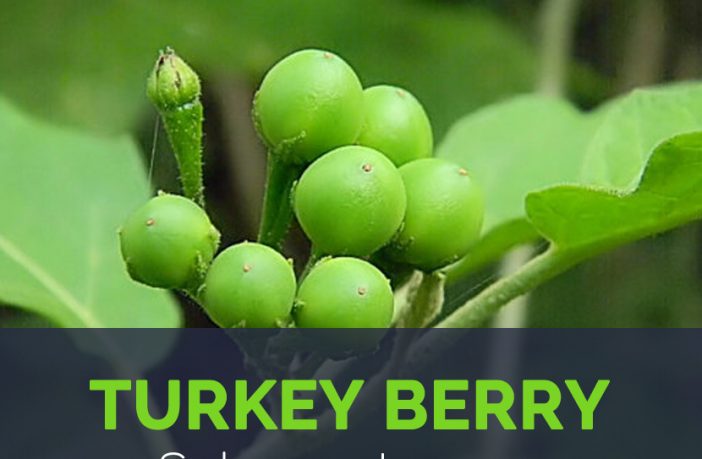
By Prof. Raphael Nyarkotey Obu
The writer
Turkey berry is a type of spiny, flowering shrub that produces large clusters of yellow-green, pea-sized berries that can be used for a variety of culinary, horticultural, and medicinal purposes.
One study by Kaunda and Zhang(2019) found that the scientific name of the turkey berry is Solanum torvum. Also, it has many names and part of the nightshade family of plants.
Other common names for turkey berries include:
• prickly nightshade
• devil’s fig
• shoo shoo bush
• wild eggplant
• pea eggplant
• susumber
Turkey berries can also be found across the world.
I have chanced on hearsay evidence that turkey berries could treat kidney issues. How true are these allegations? I herein explore this in this article.
Though it has diverse names, turkey berry is also called Amadweridi or Anona Ntroba in Fante or Kwahu nsusuwa or YaaAsantewa, while the Gadangmes call it Kantosi.
Nutritional Value
A study by Ogah M(2015) found that turkey berry is highly nutritious due to their various nutritional components. They are a good source of proteins, carbohydrates, fats, and minerals like potassium, sodium, iron, magnesium, and copper. The phytochemicals in turkey berries include phenols, alkaloids, antioxidants, sterols, and triterpenes. Below are the contents of the turkey berry:
| Nutritional components | Value per 100 g |
| Protein | 15.26 g |
| Carbohydrates | 11.57 g |
| Fibre | 5.07 g |
| Fats | 4.54 g |
| Potassium | 1.6 g |
| Sodium | 601.5 mg |
| Phosphorus | 406.10 mg |
| Magnesium | 61.10 mg |
| Iron | 18.3 mg |
| Zinc | 2.9 mg |
| Copper | 2.8 mg |
Health Benefits, Science
As a treatment For Kidney Disease?
Hearsay evidence says turkey berries reduce kidney problems. Berries can also reverse tubular necrosis and congestion in the kidney. One study by Ramamurthy et al.(2016) found that turkey berries protect the liver and the kidney against cadmium, a heavy metal. Therefore, berries may serve as functional foods against heavy metal-induced oxidative stress. Thus, turkey berries promote antioxidant enzyme activity and reduce oxidative stress – and, hence, protect against heavy metal toxicity. However, no robust human studies confirm its impact on the kidney.
Could prevent and treat anemia
For those with low iron issues, turkey berry could be their friend. The low iron level comes with many symptoms such as fatigue, dizziness, and shortness of breath. These symptoms could be improved by turkey berry consumption. This is because the plant is loaded with plant-based iron to help iron deficiency anemia.
Agbemafle et al.(2019) study found that though turkey berry is loaded with a high amount of iron, absorption in the digestive tract may be a challenge. Hence, improving the iron content could be a problem.
Lower blood pressure
Emerging studies(Ramamurthy et al. 2012; Lee et al. 2013) have found that turkey berry compounds could help improve high blood pressure naturally. This is because, turkey berry is loaded with different arrays of compounds, such as gallic acid and ferulic acid, which have shown strong antioxidant and anti-inflammatory properties in test-tube studies.
Also, a previous animal study by Mohan et al. (2009) found that turkey berry extract drastically decreased blood pressure in rats with high blood pressure. However, human studies are yet to confirm its effect on blood pressure.
Blood Sugar
Gandhi et al. (2011) conducted a study that showed that turkey berries might help reduce blood glucose levels in diabetic rats. This might be due to the phenols. These phenols act as antioxidants and may lead to insulin sensitivity and secretion. This indicates that turkey berry has the potential to lower blood glucose and thus may help in managing diabetes. However, to claim these results in humans, more studies are needed.
The best way to use turkey berries to control sugar is by drying out the turkey leaves and using their powder in cooking. Turkey berries can also be cooked and used to lower blood sugar.
Enhances healthy immune function
Some test-tube studies have found that turkey berry has potent antimicrobial properties that could enhance healthy immune function. For instance, Arthan et al.(2002) study found that turkey berries could fight herpes simplex virus.
Also, another study by Tsouh et al. (2015) found that the antimicrobial contents in them could heal wounds, heal cuts, and ulcers. More human studies are needed on their healthy immune function.
Cancer Support
Balachandran et al. (2015) conducted a study on turkey berries and explained that turkey berries may inhibit the multiplication of cells and may reduce the progression of cancer. The methyl caffeate in the turkey berries may hinder the cancer cells and induce apoptosis.
Also, another animal study by Mohan and Bhandare(2012) found that pretreatment with Solanum torvum was found to protect against doxorubicin-induced testicular toxicity in rats. This means turkey may Prevent Chemotherapy Side Effects. However, further studies are required to check the valuable properties of turkey berries on Humans.
Pain and Inflammation
Literature studies have found many natural substances that may help reduce pain and inflammation; one such discovery is turkey berries. A study by Ndebia et al. ( 2006) stated that turkey berry consumption helped reduce inflammation and pain. This effect is attributed due to the inhibition of prostaglandins (natural substances which can cause chronic pain and inflammation). This indicates that turkey berry has the potential to manage pain and inflammation and may be used to treat conditions like arthritis.
Turkey berry increases the antioxidant enzyme activity, which reduces oxidative stress. This process also protects the body against heavy metal toxicity. Several types of research (C. H. Ramamurthy, 2016) found the role of turkey berries in protecting the liver and kidney against heavy metals like cadmium.
Therefore, these berries can also help reduce oxidative stress caused by the induction of heavy metals. And works as functional foods. However, to support these claims, more studies are needed.
Prevents Intestinal Worms:
Hearsay evidence explained that regular intake of turkey berries can help reduce the formation of intestinal worms present in the intestine. These worms can cause significant health issues tap worms present in the intestine can occur because of many diseases like blockage of the intestine or in the ducts of the intestine.
The larva of these worms can move out from the intestine and migrate toward other parts of the body. This larva can cause damage to some major organs like the liver and heart.
Warnings
Any part of the plant can be used for medicinal purposes and prepared in any dosage form.
Turkey berry belongs to the same family of plants as nightshade vegetables, which includes potatoes, peppers, tomatoes, and eggplant.
Consuming a high amount of nightshades could trigger digestive and neurological symptoms, such as nausea, stomach ache, diarrhea, dizziness, and confusion(Smith et al. 2008), this is due to the presence of compounds called glycoalkaloids.
However, the content of glycoalkaloids naturally reduces as the plant matures. Thus, it’s thought to be safer to only consumefully ripe turkey berry fruit. Hence, just in case you respond negatively to it, it means it is not good for you.
Though many studies on its safety on pregnant and breastfeeding mothers have not been conducted, it is best not to eat it raw as practiced in Ghana to enhance iron content in pregnant and breastfeeding mothers(Koffuor et al. 2011).
Take Home
No robust studies have been conducted on the treatment ofkidney disease. However, studies demonstrate the many benefits associated with turkey berries in managing high blood pressure, controlling blood sugar, worm infestation, improving blood levels, etc.
NB:
Prof. Nyarkotey has strict sourcing guidelines and relies on peer-reviewed studies, academic research institutions, and medical associations to justify his write-ups. My articles are for educational purposes and do not serve as Medical advice for Treatment. I aim to educate the public about evidence-based scientific Naturopathic Therapies.
The writer is a Professor of Naturopathic Healthcare, a Medical Journalist, and a science writer. President, Nyarkotey University College of Holistic Medicine & Technology (NUCHMT)/African Naturopathic Foundation, Ashaiman, Ghana. Currently BL Candidate at the Gambia Law School, Banjul. E. mail: professor40naturopathy@gmail.com.
References
1. Smith SW, Giesbrecht E, Thompson M, Nelson LS, Hoffman RS. Solanaceous steroidal glycoalkaloids and poisoning by Solanum torvum, the normally edible susumber berry. Toxicon. 2008 Nov;52(6):667-76. doi: 10.1016/j.toxicon.2008.07.016. Epub 2008 Aug 7. PMID: 18725244.
2. Koffuor GA, Amoateng P, Andey TA. Immunomodulatory and erythropoietic effects of aqueous extract of the fruits of Solanum torvum Swartz (Solanaceae). PharmacognosyRes. 2011 Apr;3(2):130-4. doi: 10.4103/0974-8490.81961. PMID: 21772757; PMCID: PMC3129022.
3. Ogah M. Nutritional Value of Turkey Berry (Doctoral dissertation, University of Cape Coast). Available at: https://ir.ucc.edu.gh/xmlui/handle/123456789/3175
4. Ndebia EJ, Kamgang R, Nkeh-ChungagAnye BN. Analgesic and anti-inflammatory properties of aqueous extract from leaves of Solanum torvum (Solanaceae). African Journal of Traditional, Complementary and Alternative Medicines. 2007;4(2):240-4. Available at: https://www.ncbi.nlm.nih.gov/pmc/articles/PMC2816439/
5. Gandhi GR, Ignacimuthu S, Paulraj MG. Solanum torvumSwartz. fruit containing phenolic compounds shows antidiabetic and antioxidant effects in streptozotocininduced diabetic rats. Food and Chemical Toxicology. 2011 Nov 1;49(11):2725-33. Available at: https://pubmed.ncbi.nlm.nih.gov/21855597/
6. Balachandran C, Emi N, Arun Y, Yamamoto Y, Ahilan B, Sangeetha B, Duraipandiyan V, Inaguma Y, Okamoto A, Ignacimuthu S, Al-Dhabi NA. In vitro anticancer activity of methyl caffeate isolated from Solanum torvum Swartz. fruit. Chemico-biological interactions. 2015 Dec 5;242:81-
7. Kaunda JS, Zhang YJ. The Genus Solanum: An Ethnopharmacological, Phytochemical and Biological Properties Review. Nat Prod Bioprospect. 2019 Apr;9(2):77-137. doi: 10.1007/s13659-019-0201-6. Epub2019 Mar 12. PMID: 30868423; PMCID: PMC6426945.
8. Agbemafle I, Hanson N, Bries AE, Reddy MB. Alternative Protein and Iron Sources from Edible Insects but Not Solanum torvum Improved Body Composition and Iron Status in Malnourished Rats. Nutrients. 2019 Oct 16;11(10):2481. doi: 10.3390/nu11102481. PMID: 31623146; PMCID: PMC6835807.
9. Ramamurthy CH, Kumar MS, Suyavaran VS, MareeswaranR, Thirunavukkarasu C. Evaluation of antioxidant, radical scavenging activity and polyphenolics profile in Solanum torvum L. fruits. J Food Sci. 2012 Aug;77(8):C907-13. doi: 10.1111/j.1750-3841.2012.02830.x. PMID: 22860581.
10. Lee CL, Hwang TL, He WJ, Tsai YH, Yen CT, Yen HF, Chen CJ, Chang WY, Wu YC. Anti-neutrophilic inflammatory steroidal glycosides from Solanum torvum. Phytochemistry. 2013 Nov;95:315-21. doi: 10.1016/j.phytochem.2013.06.015. Epub 2013 Jul 6. PMID: 23838628.
11. Mohan M, Jaiswal BS, Kasture S. Effect of Solanum torvum on blood pressure and metabolic alterations in fructose hypertensive rats. J Ethnopharmacol. 2009 Oct 29;126(1):86-9. doi: 10.1016/j.jep.2009.08.008. Epub 2009 Aug 13. PMID: 19683046.
12. Arthan D, Svasti J, Kittakoop P, Pittayakhachonwut D, Tanticharoen M, Thebtaranonth Y. Antiviral isoflavonoidsulfate and steroidal glycosides from the fruits of Solanum torvum. Phytochemistry. 2002 Feb;59(4):459-63. doi: 10.1016/s0031-9422(01)00417-4. PMID: 11830167.
13. Tsouh Fokou PV, Nyarko AK, Appiah-Opong R, Tchokouaha Yamthe LR, Ofosuhene M, Boyom FF. Update on Medicinal Plants with Potency on Mycobacterium ulcerans. Biomed Res Int. 2015;2015:917086. doi: 10.1155/2015/917086. Epub 2015 Dec 8. PMID: 26779539; PMCID: PMC4686629.




